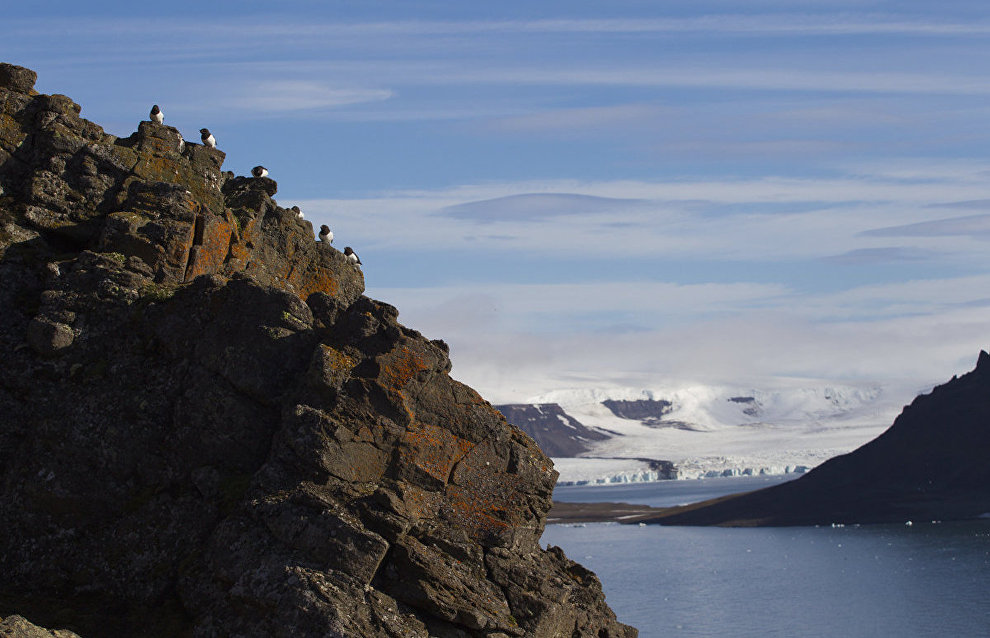Russian Arctic: Shooting Walruses with Crossbows – for Science
Part of an ongoing feature about people working in Tikhaya Bay on Franz Josef Land. For Parts 1 and 2 see: The Russian Arctic: fall in love and come back
Island of walruses and eider ducks
Myortvogo Tyulenya Island [Isle of the Dead Seal] can be reached from Tikhaya Bay by sea in a motorboat within 30-40 minutes. The little island is shared by walruses and eider ducks. Tourists are not taken to the large walrus rookery. People rarely visit the place. During the field season, in the summer, inspectors and research associates from the Russian Arctic National Park come here.
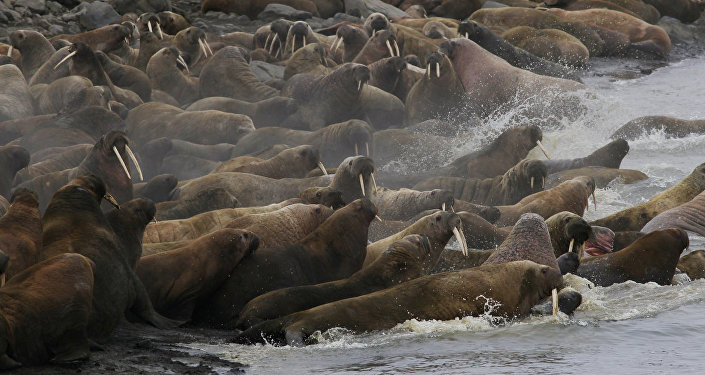
© RIA Novosti. Vera Kostamo. Walrus rookery, Isle of the Dead Seal, Franz Josef Land, Russian Arctic National Park.
The boat is cutting through the waves, spraying small bits of ice, as Maria Gavrilo, the park's deputy director for research, and I scramble to protect our equipment from the salt water.
Walruses are popping up from the water and looking left and right. Helmsman Alexei Kabanikhin is happy. After working on Gucker Island for several weeks, we are out at sea.
The waves at the shore are high, but they (I call them "science") make a collective decision not to go around the island but try to land here. Sergei and Alexei jump into the water in wetsuits and pull the boat closer to the rocks. The water temperature is below zero.
The planned operations include taking biopsy samples from walruses and removing the time-lapse cameras installed last field season. Only one of the two cameras can be seen. A check will later reveal that it took over 2,000 shots of the walrus rookery. The second camera tumbled down together with the prop, not without a little help from these animals.
Alexei arms a crossbow and approaches the walruses within shooting distance. On land, the animals do not feel very secure and look back at the man. Alexei shoots an arrow with a hollow tip that takes a small sample of biomaterial. It is retrieved by pulling the fishing line. The procedure is unpleasant, but harmless to the walrus.
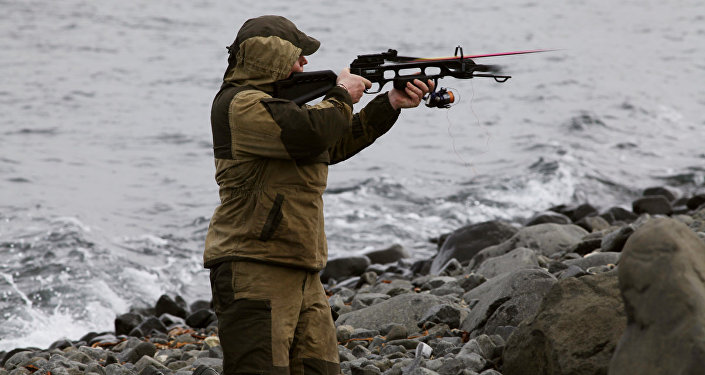
© RIA Novosti. Vera Kostamo. Alexei Kabanikhin, Isle of the Dead Seal, Franz Josef Land, Russian Arctic National Park.
The large female walrus jumps. The sample has been taken. There will be another nine quick samples like this, Alexei says.
The wind is getting stronger. Maria and Sergei go to the other side of the island, where eider ducks nest. They want to complete the work they have planned. Last season, the group had to stay on the island for many hours because of high waves.
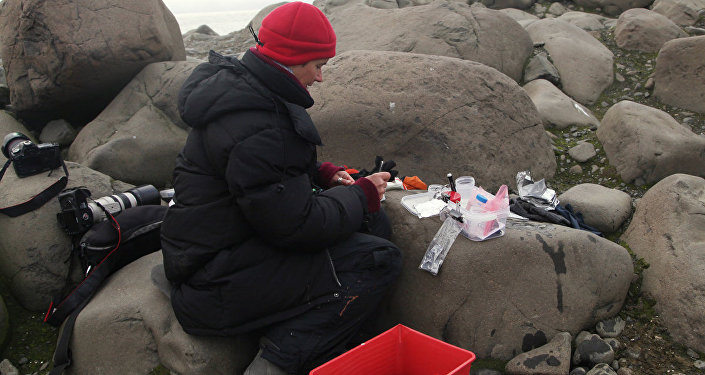
© RIA Novosti. Vera Kostamo. Maria Gavrilo, deputy director for research, Russian Arctic National Park.
From borsch to generator
Alexei enters our cabin on Tikhaya Bay. "Science" is always based in Cabin 15. So we're almost next-door neighbors. Inspectors engaged in the construction and reconstruction of the polar station and the scientific team have different tasks and timetables. So they only cross paths by dropping in like good neighbors or if they need to borrow some salt and bread.
"Yulia, could you remind me how to make borsch?"
Yulia, a park inspector this field season, gives him some tips. While the team is working on the plateau, Alexei is doing household chores. Generally, Alexei's duty, among other things, is to provide support for expeditionary work and ensure its safety.
"I've been in the park since 2013. This is my fourth season. On average I spend five months a year out in the field. I have to do practically everything, from making borsch to disassembling and assembling a diesel generator."
Alexei has been hiking and trekking for 25 years. He first went on an expedition at age four with his father. He worked in various rescue teams and the Emergencies Ministry teams.
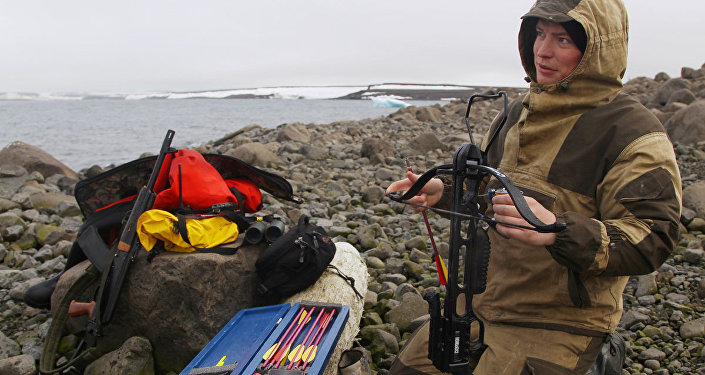
© RIA Novosti. Vera Kostamo. Alexei Kabanikhin, Isle of the Dead Seal, Franz Josef Land, Russian Arctic National Park.
"All of my skills and abilities came in handy for working in the park. Diving, working with alpine gear and various types of equipment. This is just the place for me. I have to be efficient in my work. The moment I fail to be efficientwe'll pay with a human life. I take this very seriously. Any little thing can have disastrous consequences."
Leaving to stay
Young men are smoking on the porch. They are discussing the iceberg that arrived today. The break is over. They put out their cigarette butts, and if there is no trash can nearby they put them into their jacket pockets. This habit makes people on the mainland laugh, they say.
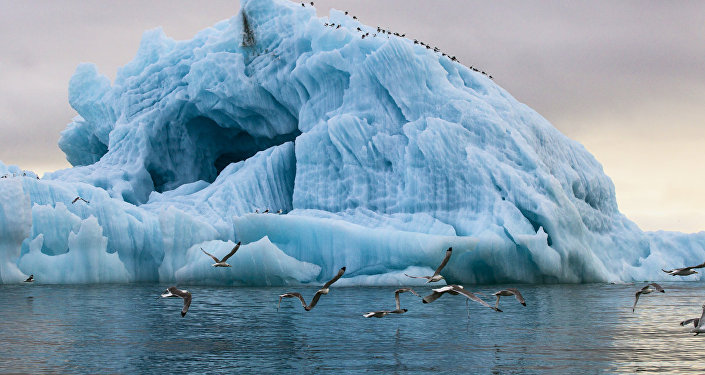
© RIA Novosti. Vera Kostamo. Iceberg in Tikhaya Bay, Franz Josef Land, Russian Arctic National Park.
They almost never talk about the end of the season or the return to the mainland. They only joke about last year, when they had to stay in Tikhaya for an extra month. If they have to stay longer this time as well, no one will mind.
The Arctic, a place that has claimed so many lives, and where courage, heroism, fear and struggle have be summoned in abundance, is quite accessible today. Sometimes that makes it feel like it has lost some of its appeal and spirit. But it's not true. The almost cosmic landscapes, the sudden gusts of wind, the storms — everything reminds you that a human being is only a guest here. The Arctic lies deep in the subconscious. The endless and timeless ice fields that you see day after day remind you that you are fragile and mostly on your own.
When they return from the field, Russian Arctic employees start preparing for a new season. The expeditionary center has to wash, clean and adjust all the equipment, to prepare it for the next season. This is a simple process, but it takes a lot of time. There is plenty of equipment and gear in the park.
The next expedition will begin in spring.
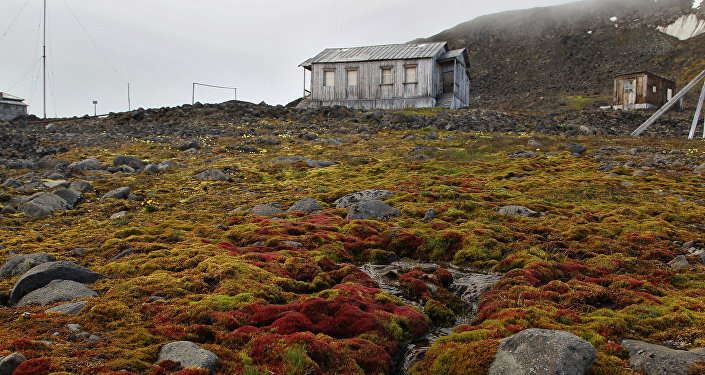
© RIA Novosti. Vera Kostamo. Tikhaya Bay, Franz Josef Land, Russian Arctic National Park.
The final touch
Staff members have to be creative both before and during expeditions. Their work is so special that quite often there is no suitable equipment or it is not close at hand.
"In April and March 2014, there were three of us working together on Alexandra Land. Our task was to make a video under the ice. We took a mop stick, fixed a GoPro camera to it and recorded some very interesting sounds, like the singing of a nightingale under the water. We were unable to identify the sound. We transferred it to the lab to be processed and it turned out that these sounds are emitted by the sea-hare," Alexei says. "We lowered all the cameras on all the mop sticks that we could find into the water. We jokingly called the device ‘mop-stick cam.' We got very interesting results: 16 episodes with seals. This is 15 more than a group of 25 Americans who worked for a month were able to produce. What's more, they used a professional underwater camera."
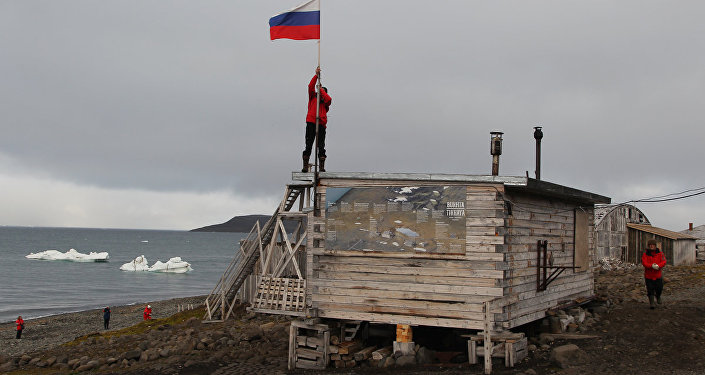
© RIA Novosti. Vera Kostamo. Mothballing a station in Tikhaya Bay for the winter.
In 2013, park associates took part in a National Geographic expedition aboard the Polaris ship. It lasted over a month.
"We worked on almost all islands of Franz Josef Land. There was an enormous amount of work to be done: everything from diving operations to escorting teams on the islands. Every day we made three or four landings on islands."
A portable radio crackles on the kitchen table. Alexei is summoned to the slope.
"It's not just the place, it's the people. This is the most important thing. Incompetent people do get to the Arctic, but they do not come to stay. The Arctic does not accept everybody. You cannot take over this territory in one fell swoop. You have to be who you are. Gradually, the Arctic will open you up, the way you really are."
Arctic.ru will continue to post Vera Kostamo's materials.
